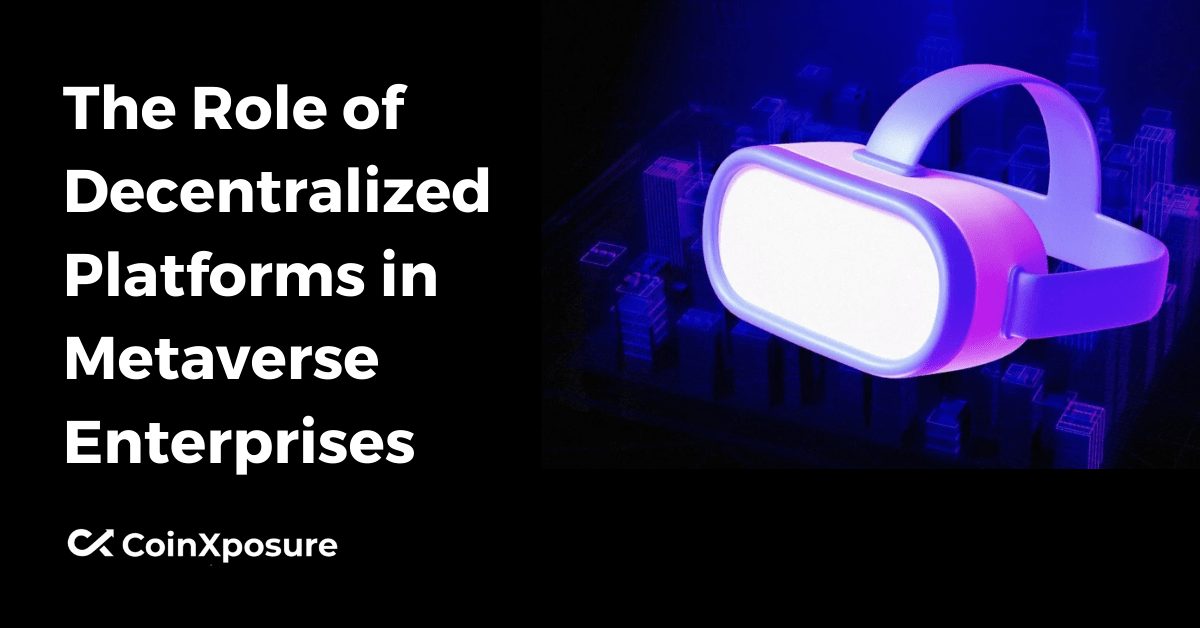
The Role of Decentralized Platforms in Metaverse Enterprises
Decentralized platforms play a significant role in metaverse enterprises. This article will discuss decentralized platforms and their role in metaverse enterprises.
The idea of the metaverse has fascinated the IT world, promising a virtual reality area where users may connect, socialize, and conduct business.
However, the metaverse’s ultimate potential is its decentralization, which is enabled by blockchain technology.
The concept of control in the metaverse is multidimensional, involving many stakeholders, from tech giants to decentralized projects and everyday individuals.
Meta, Microsoft, Apple, and Amazon are leading the way, investing extensively in creating metaverse infrastructures.
These organizations propose a virtual world where digital avatars interact using augmented reality (AR) and virtual reality (VR) technologies for business, travel, and leisure purposes.
However, no single entity owns or controls the dececentralized form of the metaverse. It is a collaborative area built and altered by its users, allowing them to own virtual land and participate in various activities.
Despite the dominance of tech giants, the metaverse’s decentralized potential implies that control ultimately rests with the users who engage in this virtual realm.
Before we go any further, let us understand what metaverse enterprises are about.
What are Metaverse Enterprises?
A metaverse enterprise is a metaverse that provides prospects for corporate growth. Metaverse enterprises are immersive virtual places where firms can sell digital products and services.
They offer new digital options for businesses to reach global audiences, promote engagement, build meaningful connections, establish leadership prospects, train staff, and more.
A metaverse enterprise appeals to millennials and Gen-Xers because it is a cutting-edge, sophisticated virtual platform.
Meta is working on one type of metaverse, whereas other software-focused groups are developing several metaverse environments.
For example, Decentraland is a virtual real estate metaverse for buying and selling land; IMVU provides social networking, shopping, and hangout chances; and Roblox allows users to create virtual worlds.
Similarly, enterprises of all sizes can construct specialized metaverses to power their activities on multiple levels.
Fashion companies, lifestyle brands, IT organizations, real estate firms, and other major but small enterprises might look for creative and cutting-edge commercial opportunities in the metaverse.
Metaverse enterprises are a work in progress. As they gain popularity, they will change to create brand uniqueness. Enterprises may make metaverses work for them in the most rewarding way by customizing them.
Marketplaces within metaverses will become essential sources of revenue. New digital services and goods forms will join the market, with the quest for worldwide clients driving economic growth.
With that, let us see some business opportunities in the metaverse for metaverse enterprises.
Business Opportunities in The Metaverse for Meterverse Enterprises
Experts believe the metaverse will amplify the mobile-internet-powered trend of user experience personalization.
Consumers will use the metaverse as a more advanced virtual space to augment their real-world experiences.
Because there is a widespread belief that the metaverse is the next generation of the internet, businesses recognize that it may someday become the most popular digital venue for customers to interact with companies.
Firms with a long-term perspective must observe and analyze shifting customer behavioral trends to avoid delays in metaverse adoption.
The transition to the metaverse will be slow and continuous, with no clear starting point. The metaverse is already here and will revolutionize how people engage with businesses.
Let us consider what prospects metaverse enterprises can give in light of current metaverse capabilities.
- Build meaningful connections
- Reach a global audience
- Drive engagements
Build Meaningful Connections
Every firm strives to strengthen its relationships with customers, prospects, and other enterprises. An enterprise metaverse promotes the formation of more meaningful bonds by instilling realism in digital contacts.
Customers and businesses may interact, communicate, and participate in new ways.
Enterprises can utilize the metaverse to track consumer requirements in real time and tailor their experiences to fulfill those needs better.
Free of technological and architectural constraints, enterprise metaverses can provide clients with fully customizable and hyper-scalable experiences through immersive 3D virtual worlds.
Reach a Global Audience
The metaverse’s ability to have global reach is perhaps its most appealing feature to businesses.
Thanks to the Internet, businesses have significantly progressed in overcoming geographical barriers and expanding into new markets. However, there is a disconnect between virtual and real-world experiences.
Visiting a store and physically testing a thing differs from choosing a product based on images and videos.
Metaverse tools and technology can bridge this gap by creating interactive and immersive 3D experiences on a massive scale.
This will allow firms to reach clients worldwide and substantially impact them, much like a regional corporation.
Prospective clients worldwide can enter the metaverse and study products and services in a more lifelike manner, receive personalization, and connect with the firm on a deeper level, just as they would with any regional company.
Drive Engagements
The metaverse, like e-commerce platforms and social media channels, is an innovation that aims to foster solid customer-business engagement for mutually advantageous opportunities.
Metaverses are aimed at driving new forms of engagement through strategies such as:
- Personalization of avatars
- Real-time communication.
- E-commerce features:
- Built-in payment
- Self-sovereign identity authentication to protect personal data
- Buying, selling, and trading opportunities with NFTs
- A global economy fuelled by cryptocurrency.
Up next, we will see the role of decentralized platforms in metaverse enterprises.
The Role of Decentralized Platforms in Metaverse Enterprises
Decentralized platforms aids metaverse enterprises in several ways, some of which are;
- Privacy and security
- User empowerment
- Interoperability and open standards
- Censorship Resistance
- Economic opportunities
- Community Governance
Privacy and Security
Decentralized platforms improve privacy and security for metaverse users.
Decentralized systems prevent user data from being concentrated in a single central authority, lowering the danger of large-scale data breaches or unwanted access.
Users can control how their personal information is shared, limiting the exposure of sensitive data.
This is one role decentralized platforms plays in metaverse enterprises.
User Empowerment
Another role decentralized platforms play in metaverse enterprises is user empowerment.
Decentralized platforms give people greater control over their virtual experiences. People own and control their data, assets, and identities in a decentralized metaverse.
They can freely engage with others, create and customize information, and keep the value they earn in the metaverse.
Interoperability and Open Standards
Decentralized platforms promote interoperability and the adoption of open standards. It enables seamless connections and interactions between virtual worlds, platforms, and apps.
Users can transfer their assets and identities between different regions of the metaverse, resulting in a more integrated and diverse ecosystem.
Censorship Resistance
A decentralized metaverse is less prone to censorship and arbitrary control. Traditional centralized platforms can control content, limit user expression, and selectively apply policies.
In a decentralized metaverse, governance and decision-making procedures are distributed, allowing for more open involvement without politicization.
Economic Opportunities
Decentralized platforms open up new economic models and prospects in the metaverse. Users can earn and sell digital goods, contribute to virtual economies, and monetize their skills and creativity.
Decentralized finance (DeFi) concepts can be utilized to enable peer-to-peer transactions and eliminate intermediaries, resulting in a more equal and accessible economic landscape.
Community Governance
Decentralized metaverses allow people to influence the metaverse’s laws, regulations, and development.
Users can control the direction and evolution of the metaverse through decentralized governance systems, ensuring that it aligns with their collective interests and beliefs.
Now that we know the role decentralized platforms play in metaverse enterprises let us see some reasons businesses enter the metaverse.
Why Businesses Can Enter The Metaverse
Enterprises can use metaverses to achieve any or all of the following aims, depending on the type of their business, customer portfolio, and business objectives.
- Content distribution
- Gamification
- Event management and sponsorship
- Digital marketing
Content Distribution
The metaverse will improve the efficiency and diversity of content dissemination. What is currently limited to text, images, and videos will soon evolve into something more graphically complex and real-time.
Perhaps a digital-twin-powered real-time demo will replace a pre-recorded product demo.
The scope of personalization, including time preference, language preference, avatar personalization, content democratization, and so on, will improve how content is distributed and consumed.
Gamification
Many enterprises use gamification for consumers, employees, and training. Gamification boosts customer loyalty and employee retention through increased involvement.
Enterprises are already gamifying consumer interactions through mobile apps, but the metaverse will take it to the next level.
Metaverse gamification can be utilized for various purposes, including education, entertainment, loyalty programs, campaigns, skill development, and staff training.
Event Management and Sponsorship
The metaverse will undoubtedly change the landscape of enterprise gatherings and conferences. The metaverse can serve as a platform for combining the finest of in-person and online events.
It can provide virtual event solutions that address modern hybrid event requirements, such as 3D immersive platforms, NFT-powered registration and ticketing, live streaming, customizable avatars, global networking, and audience interaction.
Metaverse virtual events are more than just live-streamed presentations.
They use technologies like blockchains, NFTs, holograms, AI, 3D design, digital twinning, and cryptocurrencies to present feature-rich events that provide the audience with an integrated event experience.
Attendees can tailor their event experience with 3D virtual venues, networking areas, live or pre-recorded webinar streaming, chat tools, picture booths, dApps and personalized avatars, and NFT tokens.
Digital Marketing
Any platform that can attract people will eventually emerge as a marketing medium, and the metaverse is no exception. The metaverse will provide digital marketers with a larger canvas on which to be creative.
However, it is too early to predict how digital marketing will look in the metaverse. Metaverse digital marketing improvements will constantly evolve, a process that has already begun.
Metaverse platforms such as Fortnite and Roblox offer brands advertising options that would otherwise be unavailable in the real world.
Metaverse offers digital marketers a platform for engaging with consumers, strengthening ties, increasing visibility, and improving engagement marketing.
However, significant obstacles exist, such as verifying intellectual property and digital asset ownership. NFTs can address this to a considerable extent. Also, security issues will require attention.
Final Thoughts
Decentralized platforms in metaverse enterprises encourage user autonomy, privacy, security, and engagement.
It fosters a more inclusive, varied, and user-centered virtual environment where people can freely express themselves, collaborate, and discover new opportunities.
Although total decentralization of metaverse infrastructure is not attainable for all aspects, it is critical to maximize its use wherever possible.





